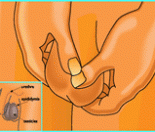Men need to know about prostate glands. This article explains the function of prostate glands and its importance to men’s health.
What is the prostate gland?
The prostate gland is a small gland, the size of a walnut, which sits between the bladder and the lower rectum in men. It surrounds the urethra which is a tube which takes urine and sperm out of the body along the length of the penis. Changes to the prostate may therefore affect passing urine and sex also. It cannot be felt during a testicular examination, it can only be felt during a rectal examination by a doctor.
The prostate gland produces seminal fluid (which is ejaculated with sperm) and has muscles which release sperm during ejaculation.
What problems may develop in the prostate gland?
There are 3 common conditions of the prostate gland:
- The prostate gland can become inflamed and this is known as prostatitis. It is caused by a urine infection or a sexually transmissible infection and is treated with antibiotics. This is more common in younger men.
- The prostate gland can also become enlarged, causing difficulties with passing urine. This is more common in older men and is called benign (non cancerous) prostatic hyperplasia. Approximately half of men over 50 have enlarged prostate glands – 90% of these growths are benign.
- Cancer can also develop in the prostate gland (only 10% of enlarged prostates will turn out to be cancer) and this is a common form of cancer, particularly over the age of 65. However, it is believed that many men who have prostate cancer are unaware of the fact and die of other unrelated causes, as it is a slow growing cancer.
What is cancer?
Cancer refers to a group of diseases, whereby cells grow in an uncontrolled way. The tumours that often result may invade organs next to it. In addition parts of the cancerous cells may break off and travel to other parts of the body – metastasis.
In comparison, a benign tumour, or lump, do not invade or spread and their size is usually limited.
What are the symptoms of prostate cancer?
There are no specific symptoms of prostate cancer, but there are symptoms that are shared with other prostate conditions:
- Needing to go to the toilet more often, as well as at night
- Less control over the flow while passing urine.
Many men with prostate cancer do not have any symptoms, or may have more generalised symptoms, such as:
- Lower back pain
- Leg or hip pain
- Groin pain.
How is prostate cancer diagnosed?
It is possible to screen for prostate cancer using a blood test to measure prostate specific antigen (PSA). However, there is concern about this test, how accurate it is and whether it should be offered to men who have no symptoms. The National Health Committee does not advise routine, widespread screening of men in New Zealand at present.
The PSA test measures the amount of the antigen in the blood to see whether it is higher than usual, which could indicate cancer or other problems with the prostate gland. Generally, the higher the level of PSA, the higher the risk of cancer.
A digital rectal examination will also usually be done by your doctor, as the prostate gland lies just in front of the rectum and therefore can be felt through the wall of the bowel. The doctor will insert a gloved finger to feel for any abnormalities in the size or shape of the prostate gland.
Neither of these tests can confirm cancer, however, so the following will be necessary if there is an increased risk of prostate cancer:
- An ultrasound scan in order to see an image of the prostate
- A needle biopsy in order to take a few cells for analysis. This has a risk of infection and bleeding after this test, therefore it will only be carries out if your doctor is concerned following the PSA blood test and the rectal examination.
Prostate cancer may spread to the surrounding lymph vessels or blood vessels and invade other organs. Diagnosis may include investigations, such as bone scans, CT scan or X-rays to check for signs of spread of the cancer.
What is the treatment for prostate cancer?
Treatment for prostate cancer may involve:
- Surgery to remove the prostate
- Radiotherapy
- A ‘wait and see’ approach if the cancer is contained and thought to be slow growing.
Due to the location of the prostate surgery or radiotherapy may affect control over passing urine, known as continence, and sexual function, such as the ability to have and maintain an erection. Your doctor will discuss these risks with you. Hence it is common to not treat a contained, slow growing prostate cancer, as the risks of the treatment may outweigh the benefits of the surgery.
What can I do to help my family?
The causes of prostate cancer are unknown, although there are possible links to fatty foods, particularly animal fats. A diet filled with fruit, vegetables and fibre, which is low in fat is known to improve overall health and decrease your risk of many diet related conditions, such as cardiovascular diseases.
Raised awareness of treatable conditions is vital to communities. Ensure that your family members are aware of prostate cancer and do not ignore possible symptoms of prostate cancer. Although it is more common in older men, younger men can get prostate cancer too.
It is also important that communities are aware that most prostate conditions are non cancerous, so that people are not afraid to come forward to be checked out.
If a close relative has had prostate cancer then this does increase your risk of developing prostate cancer too, so speak to your doctor for advice. Regular screening may be advised after the age of 40, but do speak to you own doctor for an individualised plan.
Useful articles
Check Out Your Testicles provides potentially life saving information for all men over the age of 14.
Many men are at risk of heart attacks or other cardiovascular diseases. Visit Cardiovascular Health for some invaluable advice.






Why oh why do Kiwis get so confused between “prostrate” and “prostate”?! The latter is a gland, the former is a body position…
Haha – thanks for pointing that out – a terrible typo on our end!!
My partner is about to have an operation for his enlarged prostrate,he is worried that after the operation his orgasims will not be as pleasurable with ejectulation going into the bladder, is there someone out there that has had this operation and can share their experience so that I can put my partners mind at ease. Many thanks
Hi D’s Partner,
I’m a nurse — from my experience the ‘side effects’ from the surgery vary depending on damage to the nerve endings. You’ll find that each man has a different story and this can be confusing, so I suggest that you and your partner have a chat with the surgeon prior to the surgery so that he can advice you more accurately on the symptoms that your partner may experience.